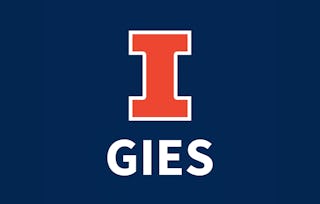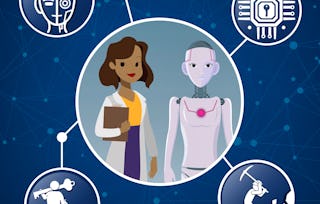Today, large intermediaries establish trust in our economy and control the movement, storage, and allocation of money and assets. The status quo, however, is rife with inefficiencies. In this course, we’ll address the many challenges of the status quo and discuss how cryptoassets, smart contracts, new identity systems, and new financial business models can help overcome them. You’ll learn how blockchain technology empowers individuals, entrepreneurs, and businesses with the tools they need to help level the playing field and to participate in the value they create. By the end of this course, you’ll learn how and why transacting on the blockchain can help us bring about a future that is faster, fairer, and more distributed than the world we inhabit today.

Blockchain, Cryptoassets, and Decentralized Finance
Ends soon: Gain next-level skills with Coursera Plus for $199 (regularly $399). Save now.

Blockchain, Cryptoassets, and Decentralized Finance
This course is part of Blockchain Revolution in Financial Services Specialization


Instructors: Don Tapscott
18,526 already enrolled
Included with
(382 reviews)
Recommended experience
What you'll learn
Describe seven types of cryptoassets, and explain what it means to “tokenize” an asset
Explain what a smart contract is, as well as various applications of smart contracts
Explore the features of a distributed, self-sovereign identity system
Describe eight core functions of the financial services industry and explain how blockchain will disrupt each of these functions
Skills you'll gain
Details to know

Add to your LinkedIn profile
16 assignments
See how employees at top companies are mastering in-demand skills

Build your subject-matter expertise
- Learn new concepts from industry experts
- Gain a foundational understanding of a subject or tool
- Develop job-relevant skills with hands-on projects
- Earn a shareable career certificate

There are 4 modules in this course
Blockchain is the first native digital medium for value. Consequently, we are witnessing one of the largest transformations of wealth in human history—from paper-based analog assets to digital ones. In this module, students will learn about nine different kinds of cryptoassets, including cryptocurrencies, protocol tokens, non-fungible tokens (NFTs), stablecoins, securities tokens, governance tokens, exchange tokens, natural asset tokens, and central bank digital currencies (CBDCs).
What's included
14 videos12 readings4 assignments2 discussion prompts
In this module, you will learn what smart contracts are and how they work. We will discuss how blockchain-based smart contracts can enable individuals and organizations to reduce transaction costs, minimize the need for third-party intermediaries, and improve productivity, security, and privacy.
What's included
11 videos4 readings5 assignments2 discussion prompts
Accessing large, centralized systems such as email, health insurance, or a bank account requires the provision of various identifiers—for example, government-issued ID cards, self-selected passwords, or biometric data. However, identifier-based systems are problematic—both administratively and philosophically. In this module you will learn about five problems with identifier-based systems and explain how a distributed self-sovereign identity system, deployed on the blockchain, can resolve many of these issues.
What's included
9 videos3 readings3 assignments2 discussion prompts
There are countless opportunities for blockchain to disrupt or displace traditional centralized business models. In this module, we explore how blockchain technology can support “open networked enterprise” business models through the inclusion of native payment systems, reputation systems, uncensorable content, trustless transactions, smart contracts, and autonomous agents.
What's included
16 videos7 readings4 assignments1 discussion prompt
Earn a career certificate
Add this credential to your LinkedIn profile, resume, or CV. Share it on social media and in your performance review.
Offered by
Explore more from Computer Security and Networks
 Status: Preview
Status: Preview Status: Free Trial
Status: Free Trial Status: Preview
Status: PreviewUniversity of Illinois Urbana-Champaign
 Status: Free Trial
Status: Free TrialUniversity of Cape Town
Why people choose Coursera for their career




Learner reviews
382 reviews
- 5 stars
76.17%
- 4 stars
15.96%
- 3 stars
4.97%
- 2 stars
2.35%
- 1 star
0.52%
Showing 3 of 382
Reviewed on Jul 25, 2021
This has been very insightful for me. The two instructors certainly took their time explaining the basics of Blockchain, cryptoassets to the understanding of anyone. Thank you.
Reviewed on Dec 9, 2021
Great intro, but needs urgent update. Absolutely recommendable as a first step into crypto and DeFi education.
Reviewed on Mar 6, 2021
Thank you! I learned and got inspired a lot. It changed my perspective completely. I am looking forward to the next courses in this specification.

Open new doors with Coursera Plus
Unlimited access to 10,000+ world-class courses, hands-on projects, and job-ready certificate programs - all included in your subscription
Advance your career with an online degree
Earn a degree from world-class universities - 100% online
Join over 3,400 global companies that choose Coursera for Business
Upskill your employees to excel in the digital economy
Frequently asked questions
To access the course materials, assignments and to earn a Certificate, you will need to purchase the Certificate experience when you enroll in a course. You can try a Free Trial instead, or apply for Financial Aid. The course may offer 'Full Course, No Certificate' instead. This option lets you see all course materials, submit required assessments, and get a final grade. This also means that you will not be able to purchase a Certificate experience.
When you enroll in the course, you get access to all of the courses in the Specialization, and you earn a certificate when you complete the work. Your electronic Certificate will be added to your Accomplishments page - from there, you can print your Certificate or add it to your LinkedIn profile.
Yes. In select learning programs, you can apply for financial aid or a scholarship if you can’t afford the enrollment fee. If fin aid or scholarship is available for your learning program selection, you’ll find a link to apply on the description page.
More questions
Financial aid available,

